Importance of Audit for Public-Listed Companies in UK & Bulgaria
VerifiedAdded on 2023/06/08
|38
|13994
|346
Report
AI Summary
This research report evaluates the effectiveness of auditing systems in the UK and Bulgaria, focusing on the importance of auditing for listed companies. The report includes an introduction outlining the research's rationale, objectives, questions, and hypotheses, followed by a literature review covering auditing practices in both countries, their limitations, and methods to improve auditing effectiveness. The research methodology section details the research design, approach, data collection process, limitations, and ethical considerations. Data analysis and interpretation are conducted through qualitative analysis, using case studies of the Royal Bank of Scotland and the Cooperative Commercial Bank of Bulgaria to illustrate the impact of auditing on corporate governance and financial stability. The report concludes by connecting the findings to the initial objectives, acknowledging study limitations, and suggesting areas for future research, emphasizing the critical role of auditing in ensuring transparency and accountability in listed companies.
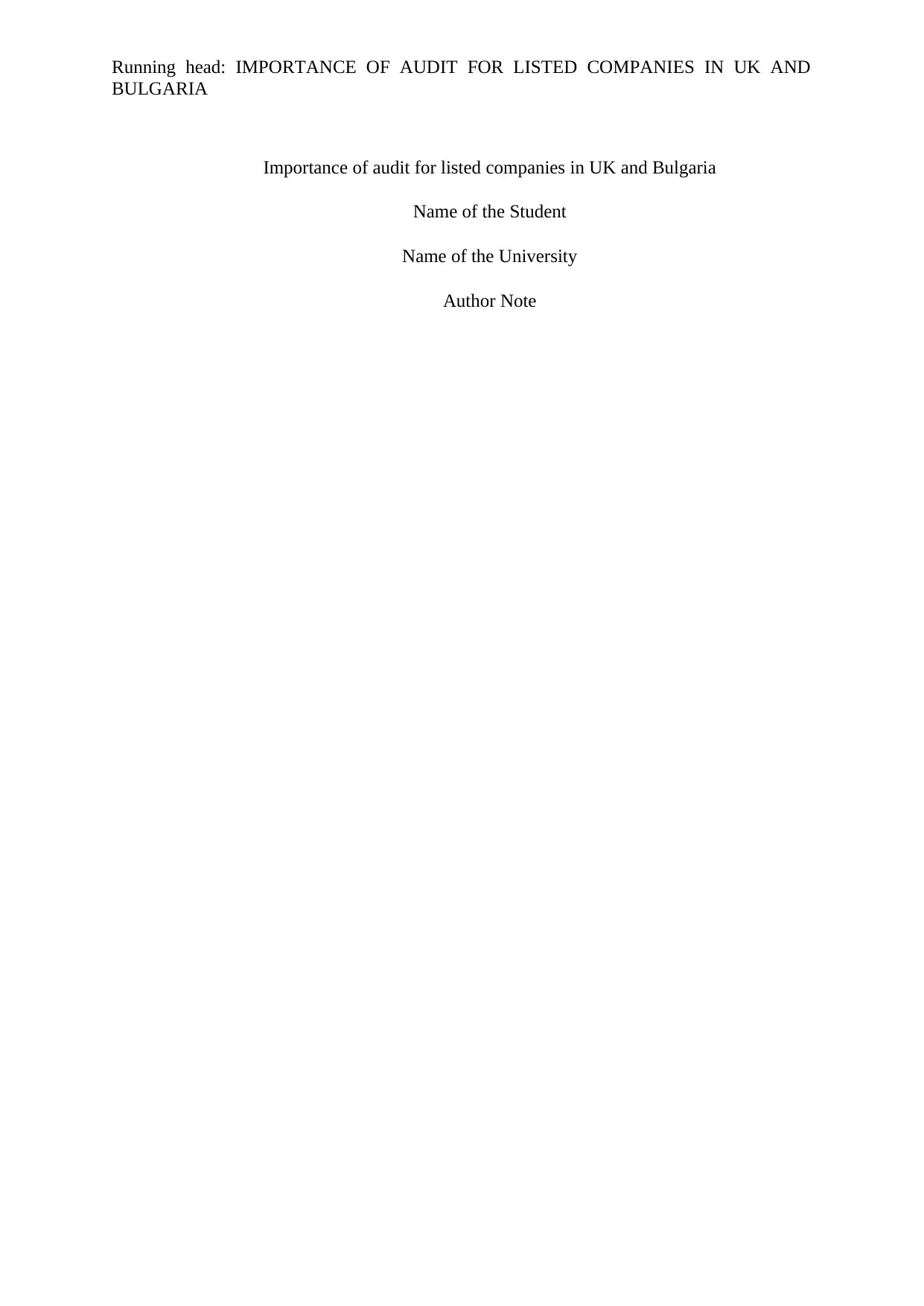
Running head: IMPORTANCE OF AUDIT FOR LISTED COMPANIES IN UK AND
BULGARIA
Importance of audit for listed companies in UK and Bulgaria
Name of the Student
Name of the University
Author Note
BULGARIA
Importance of audit for listed companies in UK and Bulgaria
Name of the Student
Name of the University
Author Note
Paraphrase This Document
Need a fresh take? Get an instant paraphrase of this document with our AI Paraphraser
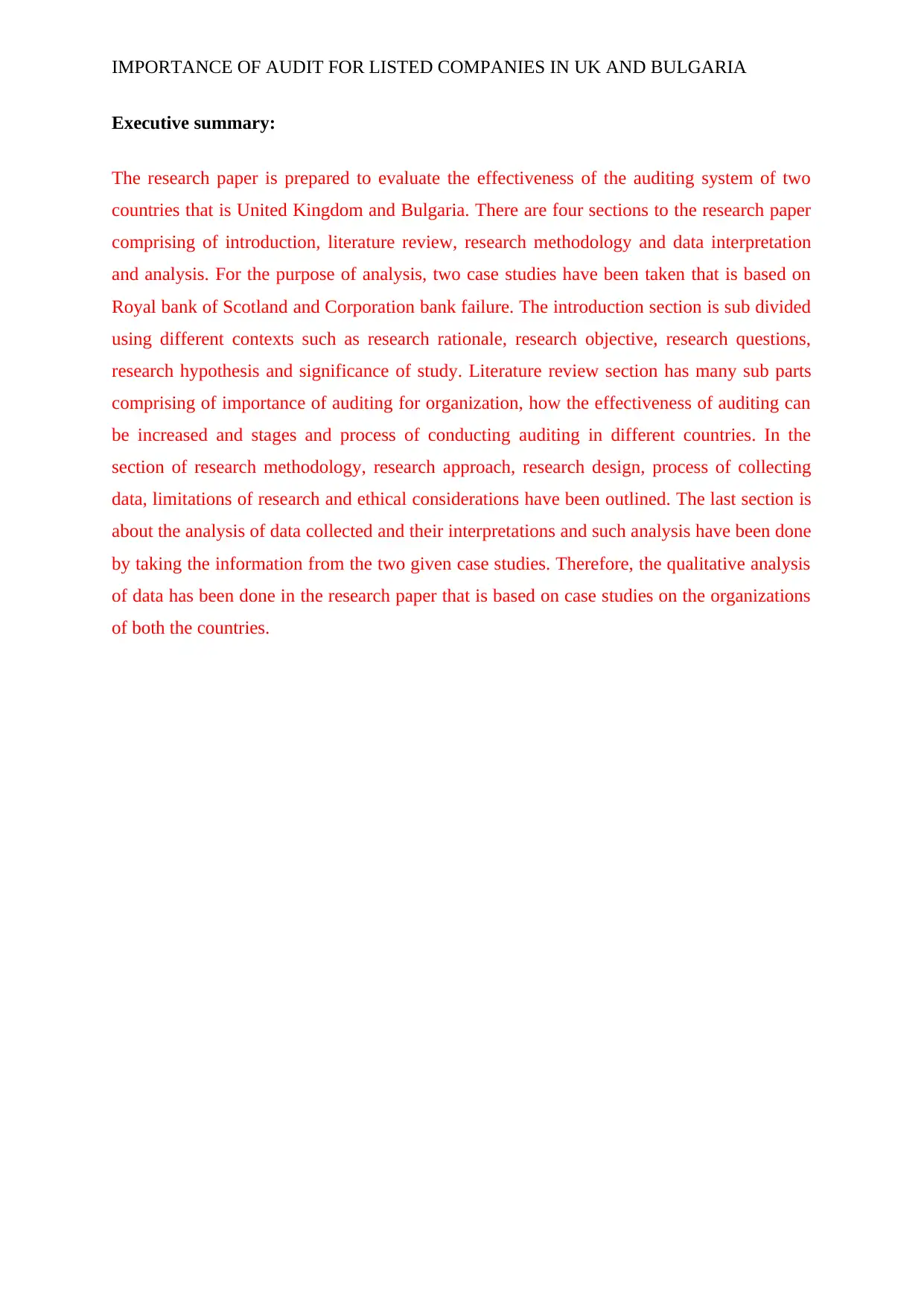
IMPORTANCE OF AUDIT FOR LISTED COMPANIES IN UK AND BULGARIA
Executive summary:
The research paper is prepared to evaluate the effectiveness of the auditing system of two
countries that is United Kingdom and Bulgaria. There are four sections to the research paper
comprising of introduction, literature review, research methodology and data interpretation
and analysis. For the purpose of analysis, two case studies have been taken that is based on
Royal bank of Scotland and Corporation bank failure. The introduction section is sub divided
using different contexts such as research rationale, research objective, research questions,
research hypothesis and significance of study. Literature review section has many sub parts
comprising of importance of auditing for organization, how the effectiveness of auditing can
be increased and stages and process of conducting auditing in different countries. In the
section of research methodology, research approach, research design, process of collecting
data, limitations of research and ethical considerations have been outlined. The last section is
about the analysis of data collected and their interpretations and such analysis have been done
by taking the information from the two given case studies. Therefore, the qualitative analysis
of data has been done in the research paper that is based on case studies on the organizations
of both the countries.
Executive summary:
The research paper is prepared to evaluate the effectiveness of the auditing system of two
countries that is United Kingdom and Bulgaria. There are four sections to the research paper
comprising of introduction, literature review, research methodology and data interpretation
and analysis. For the purpose of analysis, two case studies have been taken that is based on
Royal bank of Scotland and Corporation bank failure. The introduction section is sub divided
using different contexts such as research rationale, research objective, research questions,
research hypothesis and significance of study. Literature review section has many sub parts
comprising of importance of auditing for organization, how the effectiveness of auditing can
be increased and stages and process of conducting auditing in different countries. In the
section of research methodology, research approach, research design, process of collecting
data, limitations of research and ethical considerations have been outlined. The last section is
about the analysis of data collected and their interpretations and such analysis have been done
by taking the information from the two given case studies. Therefore, the qualitative analysis
of data has been done in the research paper that is based on case studies on the organizations
of both the countries.
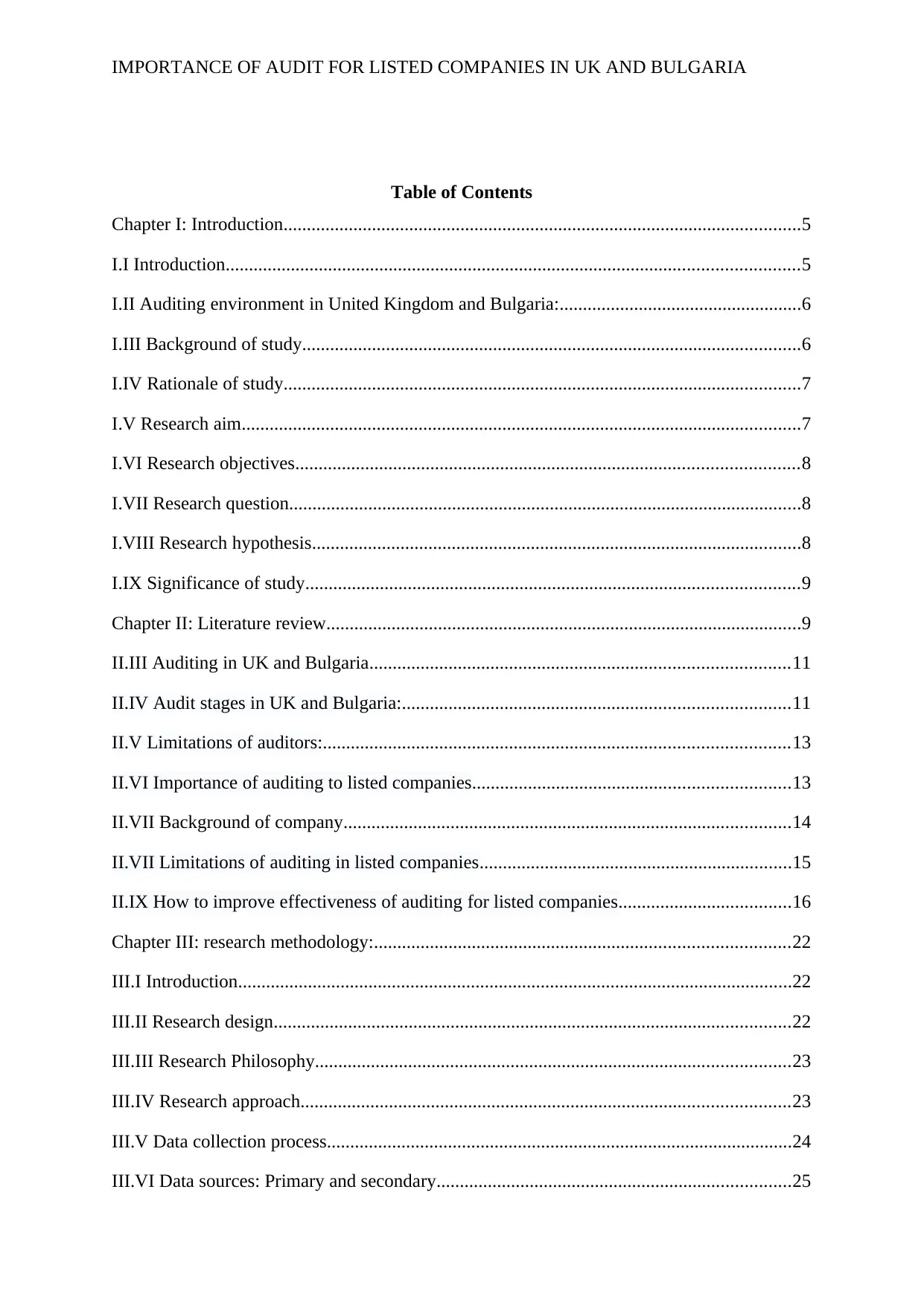
IMPORTANCE OF AUDIT FOR LISTED COMPANIES IN UK AND BULGARIA
Table of Contents
Chapter I: Introduction...............................................................................................................5
I.I Introduction...........................................................................................................................5
I.II Auditing environment in United Kingdom and Bulgaria:....................................................6
I.III Background of study...........................................................................................................6
I.IV Rationale of study...............................................................................................................7
I.V Research aim........................................................................................................................7
I.VI Research objectives............................................................................................................8
I.VII Research question..............................................................................................................8
I.VIII Research hypothesis.........................................................................................................8
I.IX Significance of study..........................................................................................................9
Chapter II: Literature review......................................................................................................9
II.III Auditing in UK and Bulgaria..........................................................................................11
II.IV Audit stages in UK and Bulgaria:...................................................................................11
II.V Limitations of auditors:....................................................................................................13
II.VI Importance of auditing to listed companies....................................................................13
II.VII Background of company................................................................................................14
II.VII Limitations of auditing in listed companies...................................................................15
II.IX How to improve effectiveness of auditing for listed companies.....................................16
Chapter III: research methodology:.........................................................................................22
III.I Introduction.......................................................................................................................22
III.II Research design...............................................................................................................22
III.III Research Philosophy......................................................................................................23
III.IV Research approach.........................................................................................................23
III.V Data collection process....................................................................................................24
III.VI Data sources: Primary and secondary............................................................................25
Table of Contents
Chapter I: Introduction...............................................................................................................5
I.I Introduction...........................................................................................................................5
I.II Auditing environment in United Kingdom and Bulgaria:....................................................6
I.III Background of study...........................................................................................................6
I.IV Rationale of study...............................................................................................................7
I.V Research aim........................................................................................................................7
I.VI Research objectives............................................................................................................8
I.VII Research question..............................................................................................................8
I.VIII Research hypothesis.........................................................................................................8
I.IX Significance of study..........................................................................................................9
Chapter II: Literature review......................................................................................................9
II.III Auditing in UK and Bulgaria..........................................................................................11
II.IV Audit stages in UK and Bulgaria:...................................................................................11
II.V Limitations of auditors:....................................................................................................13
II.VI Importance of auditing to listed companies....................................................................13
II.VII Background of company................................................................................................14
II.VII Limitations of auditing in listed companies...................................................................15
II.IX How to improve effectiveness of auditing for listed companies.....................................16
Chapter III: research methodology:.........................................................................................22
III.I Introduction.......................................................................................................................22
III.II Research design...............................................................................................................22
III.III Research Philosophy......................................................................................................23
III.IV Research approach.........................................................................................................23
III.V Data collection process....................................................................................................24
III.VI Data sources: Primary and secondary............................................................................25
⊘ This is a preview!⊘
Do you want full access?
Subscribe today to unlock all pages.

Trusted by 1+ million students worldwide
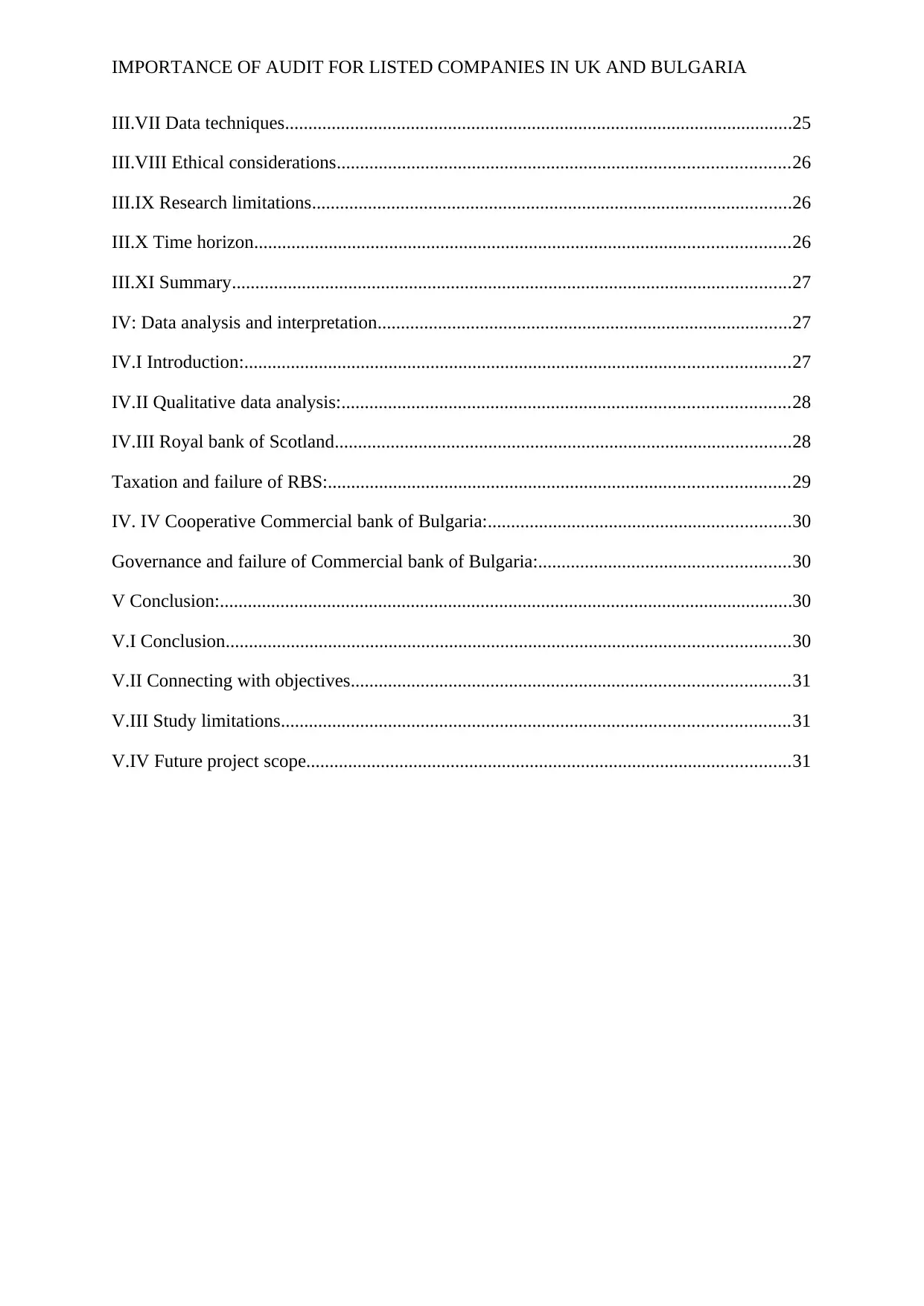
IMPORTANCE OF AUDIT FOR LISTED COMPANIES IN UK AND BULGARIA
III.VII Data techniques.............................................................................................................25
III.VIII Ethical considerations.................................................................................................26
III.IX Research limitations.......................................................................................................26
III.X Time horizon...................................................................................................................26
III.XI Summary........................................................................................................................27
IV: Data analysis and interpretation.........................................................................................27
IV.I Introduction:.....................................................................................................................27
IV.II Qualitative data analysis:................................................................................................28
IV.III Royal bank of Scotland..................................................................................................28
Taxation and failure of RBS:...................................................................................................29
IV. IV Cooperative Commercial bank of Bulgaria:.................................................................30
Governance and failure of Commercial bank of Bulgaria:......................................................30
V Conclusion:...........................................................................................................................30
V.I Conclusion.........................................................................................................................30
V.II Connecting with objectives..............................................................................................31
V.III Study limitations.............................................................................................................31
V.IV Future project scope........................................................................................................31
III.VII Data techniques.............................................................................................................25
III.VIII Ethical considerations.................................................................................................26
III.IX Research limitations.......................................................................................................26
III.X Time horizon...................................................................................................................26
III.XI Summary........................................................................................................................27
IV: Data analysis and interpretation.........................................................................................27
IV.I Introduction:.....................................................................................................................27
IV.II Qualitative data analysis:................................................................................................28
IV.III Royal bank of Scotland..................................................................................................28
Taxation and failure of RBS:...................................................................................................29
IV. IV Cooperative Commercial bank of Bulgaria:.................................................................30
Governance and failure of Commercial bank of Bulgaria:......................................................30
V Conclusion:...........................................................................................................................30
V.I Conclusion.........................................................................................................................30
V.II Connecting with objectives..............................................................................................31
V.III Study limitations.............................................................................................................31
V.IV Future project scope........................................................................................................31
Paraphrase This Document
Need a fresh take? Get an instant paraphrase of this document with our AI Paraphraser
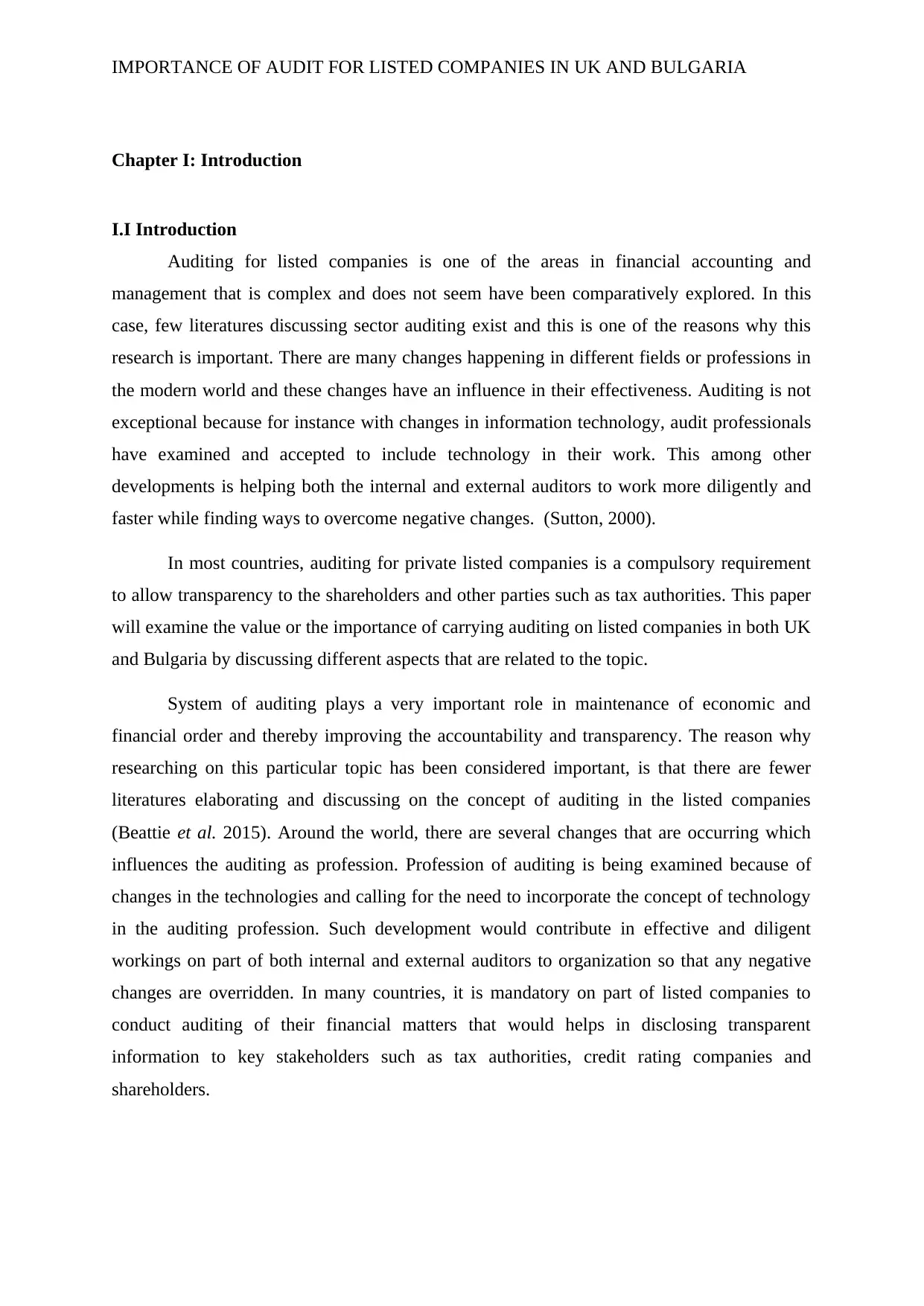
IMPORTANCE OF AUDIT FOR LISTED COMPANIES IN UK AND BULGARIA
Chapter I: Introduction
I.I Introduction
Auditing for listed companies is one of the areas in financial accounting and
management that is complex and does not seem have been comparatively explored. In this
case, few literatures discussing sector auditing exist and this is one of the reasons why this
research is important. There are many changes happening in different fields or professions in
the modern world and these changes have an influence in their effectiveness. Auditing is not
exceptional because for instance with changes in information technology, audit professionals
have examined and accepted to include technology in their work. This among other
developments is helping both the internal and external auditors to work more diligently and
faster while finding ways to overcome negative changes. (Sutton, 2000).
In most countries, auditing for private listed companies is a compulsory requirement
to allow transparency to the shareholders and other parties such as tax authorities. This paper
will examine the value or the importance of carrying auditing on listed companies in both UK
and Bulgaria by discussing different aspects that are related to the topic.
System of auditing plays a very important role in maintenance of economic and
financial order and thereby improving the accountability and transparency. The reason why
researching on this particular topic has been considered important, is that there are fewer
literatures elaborating and discussing on the concept of auditing in the listed companies
(Beattie et al. 2015). Around the world, there are several changes that are occurring which
influences the auditing as profession. Profession of auditing is being examined because of
changes in the technologies and calling for the need to incorporate the concept of technology
in the auditing profession. Such development would contribute in effective and diligent
workings on part of both internal and external auditors to organization so that any negative
changes are overridden. In many countries, it is mandatory on part of listed companies to
conduct auditing of their financial matters that would helps in disclosing transparent
information to key stakeholders such as tax authorities, credit rating companies and
shareholders.
Chapter I: Introduction
I.I Introduction
Auditing for listed companies is one of the areas in financial accounting and
management that is complex and does not seem have been comparatively explored. In this
case, few literatures discussing sector auditing exist and this is one of the reasons why this
research is important. There are many changes happening in different fields or professions in
the modern world and these changes have an influence in their effectiveness. Auditing is not
exceptional because for instance with changes in information technology, audit professionals
have examined and accepted to include technology in their work. This among other
developments is helping both the internal and external auditors to work more diligently and
faster while finding ways to overcome negative changes. (Sutton, 2000).
In most countries, auditing for private listed companies is a compulsory requirement
to allow transparency to the shareholders and other parties such as tax authorities. This paper
will examine the value or the importance of carrying auditing on listed companies in both UK
and Bulgaria by discussing different aspects that are related to the topic.
System of auditing plays a very important role in maintenance of economic and
financial order and thereby improving the accountability and transparency. The reason why
researching on this particular topic has been considered important, is that there are fewer
literatures elaborating and discussing on the concept of auditing in the listed companies
(Beattie et al. 2015). Around the world, there are several changes that are occurring which
influences the auditing as profession. Profession of auditing is being examined because of
changes in the technologies and calling for the need to incorporate the concept of technology
in the auditing profession. Such development would contribute in effective and diligent
workings on part of both internal and external auditors to organization so that any negative
changes are overridden. In many countries, it is mandatory on part of listed companies to
conduct auditing of their financial matters that would helps in disclosing transparent
information to key stakeholders such as tax authorities, credit rating companies and
shareholders.
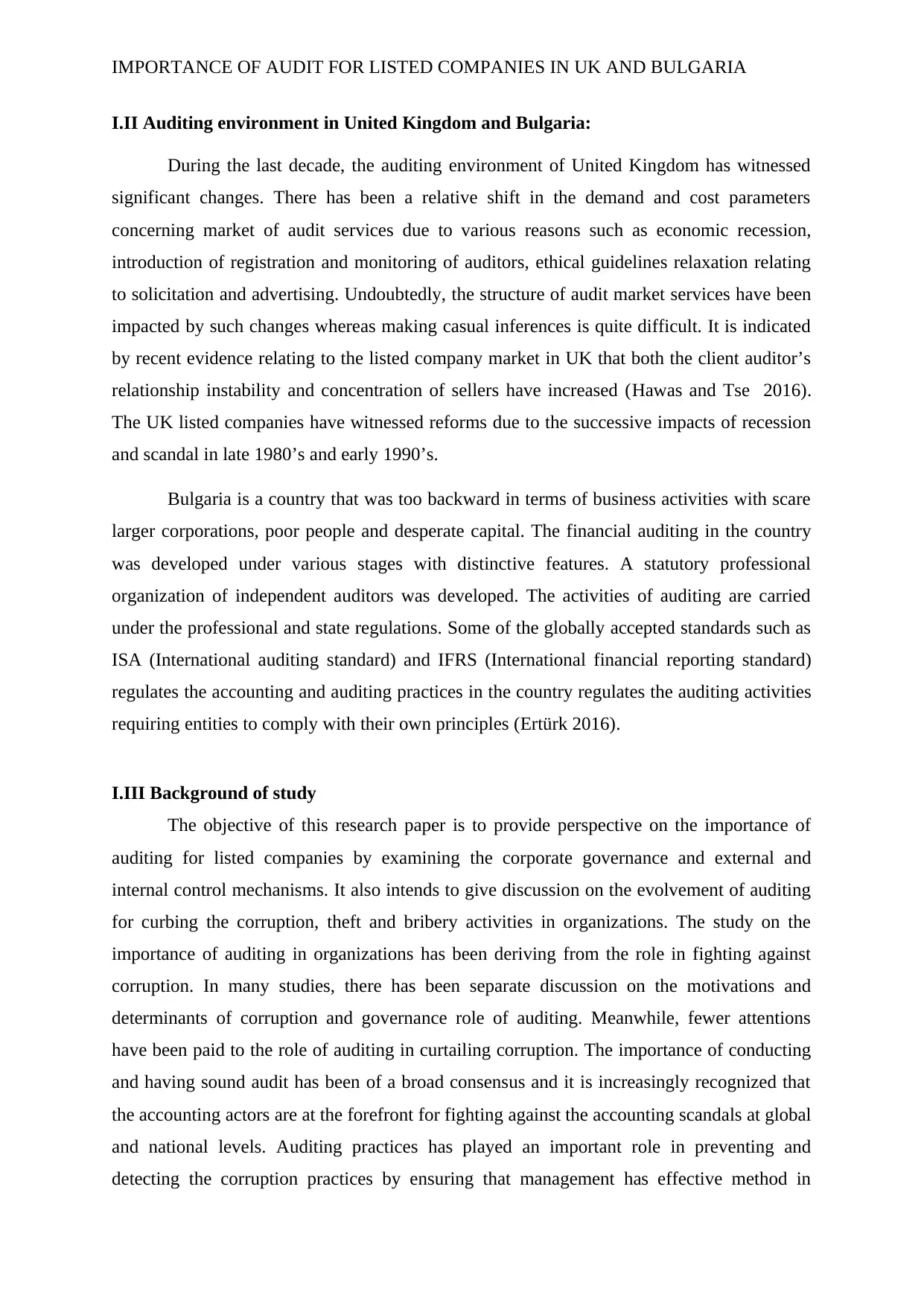
IMPORTANCE OF AUDIT FOR LISTED COMPANIES IN UK AND BULGARIA
I.II Auditing environment in United Kingdom and Bulgaria:
During the last decade, the auditing environment of United Kingdom has witnessed
significant changes. There has been a relative shift in the demand and cost parameters
concerning market of audit services due to various reasons such as economic recession,
introduction of registration and monitoring of auditors, ethical guidelines relaxation relating
to solicitation and advertising. Undoubtedly, the structure of audit market services have been
impacted by such changes whereas making casual inferences is quite difficult. It is indicated
by recent evidence relating to the listed company market in UK that both the client auditor’s
relationship instability and concentration of sellers have increased (Hawas and Tse 2016).
The UK listed companies have witnessed reforms due to the successive impacts of recession
and scandal in late 1980’s and early 1990’s.
Bulgaria is a country that was too backward in terms of business activities with scare
larger corporations, poor people and desperate capital. The financial auditing in the country
was developed under various stages with distinctive features. A statutory professional
organization of independent auditors was developed. The activities of auditing are carried
under the professional and state regulations. Some of the globally accepted standards such as
ISA (International auditing standard) and IFRS (International financial reporting standard)
regulates the accounting and auditing practices in the country regulates the auditing activities
requiring entities to comply with their own principles (Ertürk 2016).
I.III Background of study
The objective of this research paper is to provide perspective on the importance of
auditing for listed companies by examining the corporate governance and external and
internal control mechanisms. It also intends to give discussion on the evolvement of auditing
for curbing the corruption, theft and bribery activities in organizations. The study on the
importance of auditing in organizations has been deriving from the role in fighting against
corruption. In many studies, there has been separate discussion on the motivations and
determinants of corruption and governance role of auditing. Meanwhile, fewer attentions
have been paid to the role of auditing in curtailing corruption. The importance of conducting
and having sound audit has been of a broad consensus and it is increasingly recognized that
the accounting actors are at the forefront for fighting against the accounting scandals at global
and national levels. Auditing practices has played an important role in preventing and
detecting the corruption practices by ensuring that management has effective method in
I.II Auditing environment in United Kingdom and Bulgaria:
During the last decade, the auditing environment of United Kingdom has witnessed
significant changes. There has been a relative shift in the demand and cost parameters
concerning market of audit services due to various reasons such as economic recession,
introduction of registration and monitoring of auditors, ethical guidelines relaxation relating
to solicitation and advertising. Undoubtedly, the structure of audit market services have been
impacted by such changes whereas making casual inferences is quite difficult. It is indicated
by recent evidence relating to the listed company market in UK that both the client auditor’s
relationship instability and concentration of sellers have increased (Hawas and Tse 2016).
The UK listed companies have witnessed reforms due to the successive impacts of recession
and scandal in late 1980’s and early 1990’s.
Bulgaria is a country that was too backward in terms of business activities with scare
larger corporations, poor people and desperate capital. The financial auditing in the country
was developed under various stages with distinctive features. A statutory professional
organization of independent auditors was developed. The activities of auditing are carried
under the professional and state regulations. Some of the globally accepted standards such as
ISA (International auditing standard) and IFRS (International financial reporting standard)
regulates the accounting and auditing practices in the country regulates the auditing activities
requiring entities to comply with their own principles (Ertürk 2016).
I.III Background of study
The objective of this research paper is to provide perspective on the importance of
auditing for listed companies by examining the corporate governance and external and
internal control mechanisms. It also intends to give discussion on the evolvement of auditing
for curbing the corruption, theft and bribery activities in organizations. The study on the
importance of auditing in organizations has been deriving from the role in fighting against
corruption. In many studies, there has been separate discussion on the motivations and
determinants of corruption and governance role of auditing. Meanwhile, fewer attentions
have been paid to the role of auditing in curtailing corruption. The importance of conducting
and having sound audit has been of a broad consensus and it is increasingly recognized that
the accounting actors are at the forefront for fighting against the accounting scandals at global
and national levels. Auditing practices has played an important role in preventing and
detecting the corruption practices by ensuring that management has effective method in
⊘ This is a preview!⊘
Do you want full access?
Subscribe today to unlock all pages.

Trusted by 1+ million students worldwide
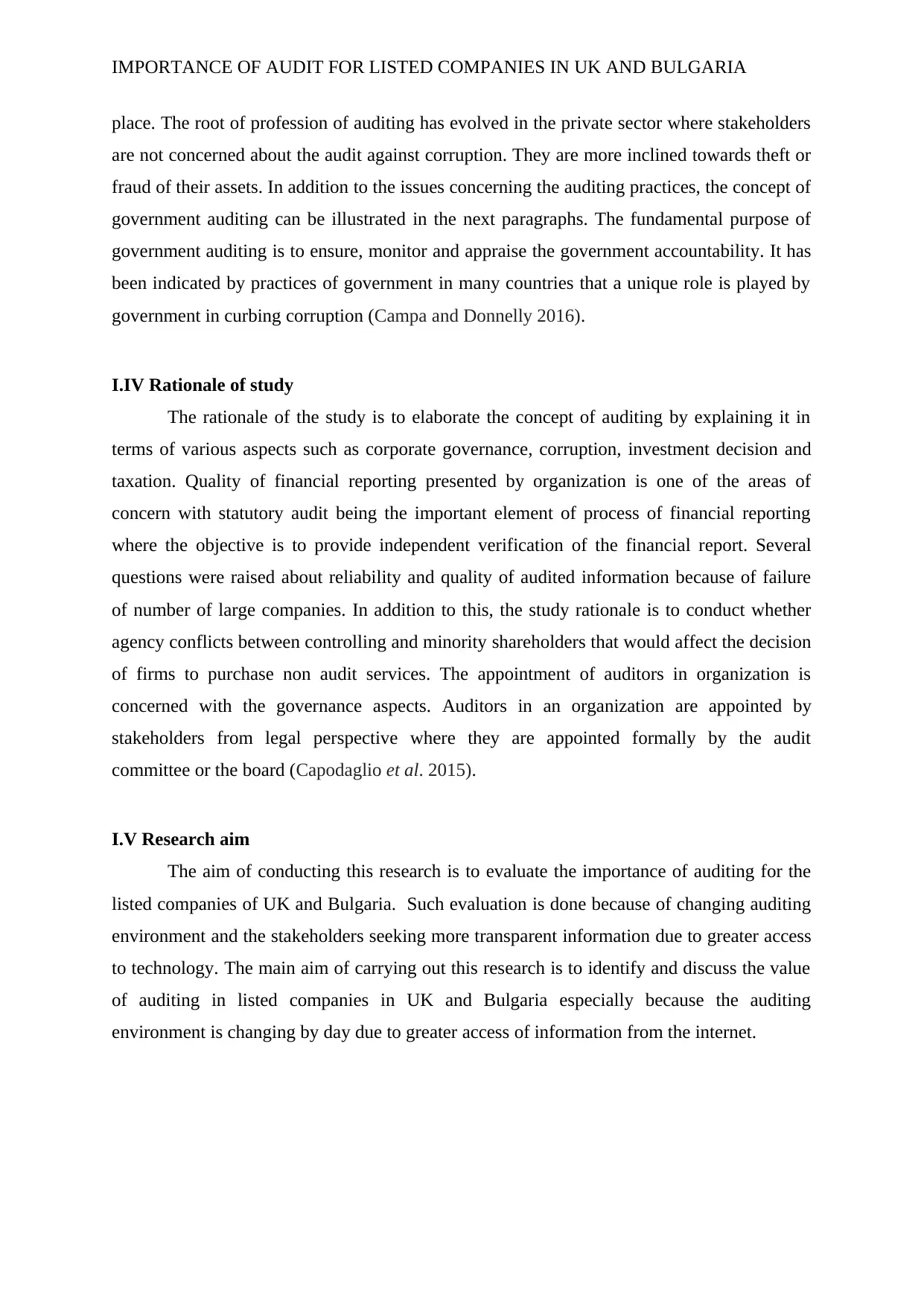
IMPORTANCE OF AUDIT FOR LISTED COMPANIES IN UK AND BULGARIA
place. The root of profession of auditing has evolved in the private sector where stakeholders
are not concerned about the audit against corruption. They are more inclined towards theft or
fraud of their assets. In addition to the issues concerning the auditing practices, the concept of
government auditing can be illustrated in the next paragraphs. The fundamental purpose of
government auditing is to ensure, monitor and appraise the government accountability. It has
been indicated by practices of government in many countries that a unique role is played by
government in curbing corruption (Campa and Donnelly 2016).
I.IV Rationale of study
The rationale of the study is to elaborate the concept of auditing by explaining it in
terms of various aspects such as corporate governance, corruption, investment decision and
taxation. Quality of financial reporting presented by organization is one of the areas of
concern with statutory audit being the important element of process of financial reporting
where the objective is to provide independent verification of the financial report. Several
questions were raised about reliability and quality of audited information because of failure
of number of large companies. In addition to this, the study rationale is to conduct whether
agency conflicts between controlling and minority shareholders that would affect the decision
of firms to purchase non audit services. The appointment of auditors in organization is
concerned with the governance aspects. Auditors in an organization are appointed by
stakeholders from legal perspective where they are appointed formally by the audit
committee or the board (Capodaglio et al. 2015).
I.V Research aim
The aim of conducting this research is to evaluate the importance of auditing for the
listed companies of UK and Bulgaria. Such evaluation is done because of changing auditing
environment and the stakeholders seeking more transparent information due to greater access
to technology. The main aim of carrying out this research is to identify and discuss the value
of auditing in listed companies in UK and Bulgaria especially because the auditing
environment is changing by day due to greater access of information from the internet.
place. The root of profession of auditing has evolved in the private sector where stakeholders
are not concerned about the audit against corruption. They are more inclined towards theft or
fraud of their assets. In addition to the issues concerning the auditing practices, the concept of
government auditing can be illustrated in the next paragraphs. The fundamental purpose of
government auditing is to ensure, monitor and appraise the government accountability. It has
been indicated by practices of government in many countries that a unique role is played by
government in curbing corruption (Campa and Donnelly 2016).
I.IV Rationale of study
The rationale of the study is to elaborate the concept of auditing by explaining it in
terms of various aspects such as corporate governance, corruption, investment decision and
taxation. Quality of financial reporting presented by organization is one of the areas of
concern with statutory audit being the important element of process of financial reporting
where the objective is to provide independent verification of the financial report. Several
questions were raised about reliability and quality of audited information because of failure
of number of large companies. In addition to this, the study rationale is to conduct whether
agency conflicts between controlling and minority shareholders that would affect the decision
of firms to purchase non audit services. The appointment of auditors in organization is
concerned with the governance aspects. Auditors in an organization are appointed by
stakeholders from legal perspective where they are appointed formally by the audit
committee or the board (Capodaglio et al. 2015).
I.V Research aim
The aim of conducting this research is to evaluate the importance of auditing for the
listed companies of UK and Bulgaria. Such evaluation is done because of changing auditing
environment and the stakeholders seeking more transparent information due to greater access
to technology. The main aim of carrying out this research is to identify and discuss the value
of auditing in listed companies in UK and Bulgaria especially because the auditing
environment is changing by day due to greater access of information from the internet.
Paraphrase This Document
Need a fresh take? Get an instant paraphrase of this document with our AI Paraphraser
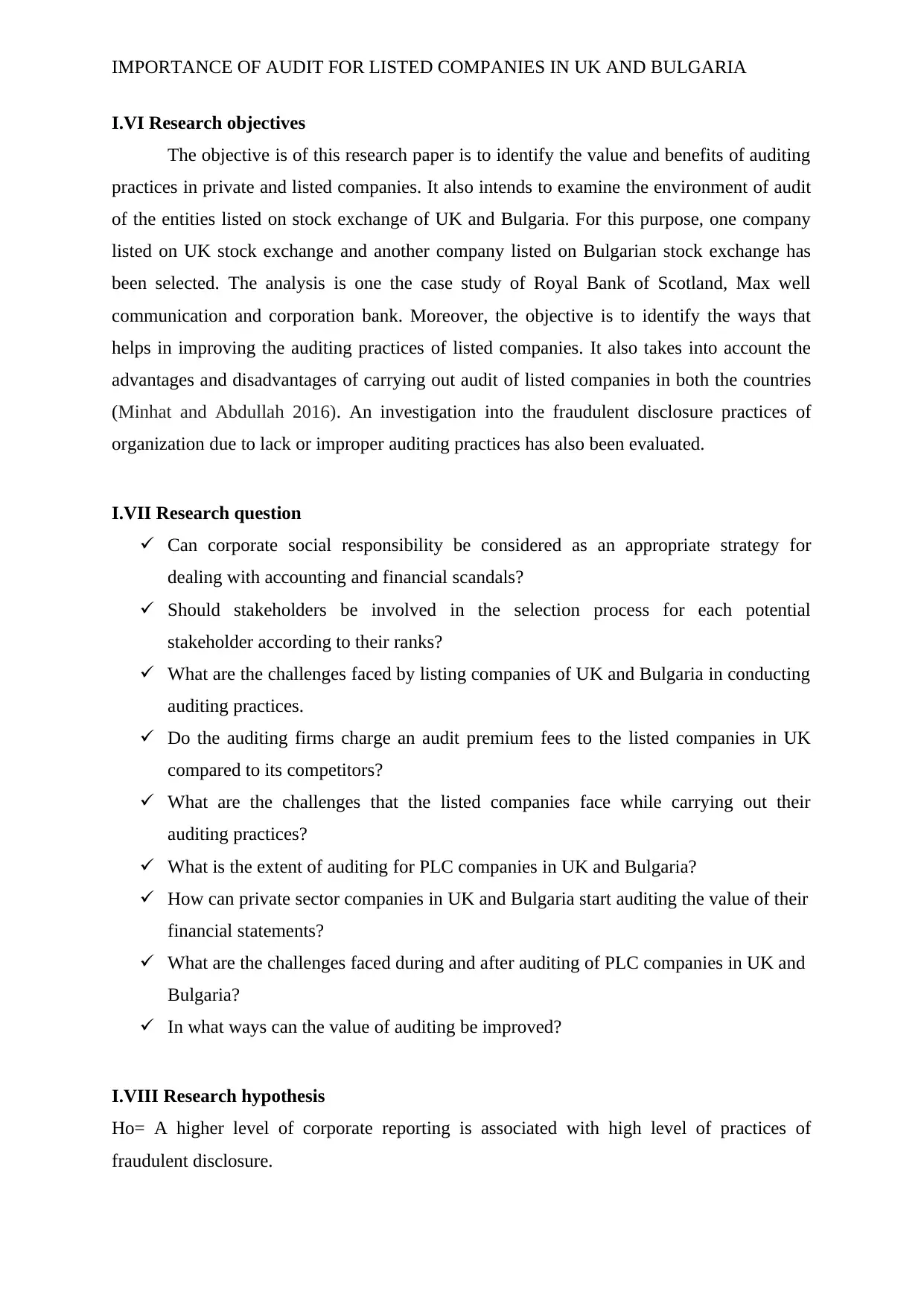
IMPORTANCE OF AUDIT FOR LISTED COMPANIES IN UK AND BULGARIA
I.VI Research objectives
The objective is of this research paper is to identify the value and benefits of auditing
practices in private and listed companies. It also intends to examine the environment of audit
of the entities listed on stock exchange of UK and Bulgaria. For this purpose, one company
listed on UK stock exchange and another company listed on Bulgarian stock exchange has
been selected. The analysis is one the case study of Royal Bank of Scotland, Max well
communication and corporation bank. Moreover, the objective is to identify the ways that
helps in improving the auditing practices of listed companies. It also takes into account the
advantages and disadvantages of carrying out audit of listed companies in both the countries
(Minhat and Abdullah 2016). An investigation into the fraudulent disclosure practices of
organization due to lack or improper auditing practices has also been evaluated.
I.VII Research question
Can corporate social responsibility be considered as an appropriate strategy for
dealing with accounting and financial scandals?
Should stakeholders be involved in the selection process for each potential
stakeholder according to their ranks?
What are the challenges faced by listing companies of UK and Bulgaria in conducting
auditing practices.
Do the auditing firms charge an audit premium fees to the listed companies in UK
compared to its competitors?
What are the challenges that the listed companies face while carrying out their
auditing practices?
What is the extent of auditing for PLC companies in UK and Bulgaria?
How can private sector companies in UK and Bulgaria start auditing the value of their
financial statements?
What are the challenges faced during and after auditing of PLC companies in UK and
Bulgaria?
In what ways can the value of auditing be improved?
I.VIII Research hypothesis
Ho= A higher level of corporate reporting is associated with high level of practices of
fraudulent disclosure.
I.VI Research objectives
The objective is of this research paper is to identify the value and benefits of auditing
practices in private and listed companies. It also intends to examine the environment of audit
of the entities listed on stock exchange of UK and Bulgaria. For this purpose, one company
listed on UK stock exchange and another company listed on Bulgarian stock exchange has
been selected. The analysis is one the case study of Royal Bank of Scotland, Max well
communication and corporation bank. Moreover, the objective is to identify the ways that
helps in improving the auditing practices of listed companies. It also takes into account the
advantages and disadvantages of carrying out audit of listed companies in both the countries
(Minhat and Abdullah 2016). An investigation into the fraudulent disclosure practices of
organization due to lack or improper auditing practices has also been evaluated.
I.VII Research question
Can corporate social responsibility be considered as an appropriate strategy for
dealing with accounting and financial scandals?
Should stakeholders be involved in the selection process for each potential
stakeholder according to their ranks?
What are the challenges faced by listing companies of UK and Bulgaria in conducting
auditing practices.
Do the auditing firms charge an audit premium fees to the listed companies in UK
compared to its competitors?
What are the challenges that the listed companies face while carrying out their
auditing practices?
What is the extent of auditing for PLC companies in UK and Bulgaria?
How can private sector companies in UK and Bulgaria start auditing the value of their
financial statements?
What are the challenges faced during and after auditing of PLC companies in UK and
Bulgaria?
In what ways can the value of auditing be improved?
I.VIII Research hypothesis
Ho= A higher level of corporate reporting is associated with high level of practices of
fraudulent disclosure.
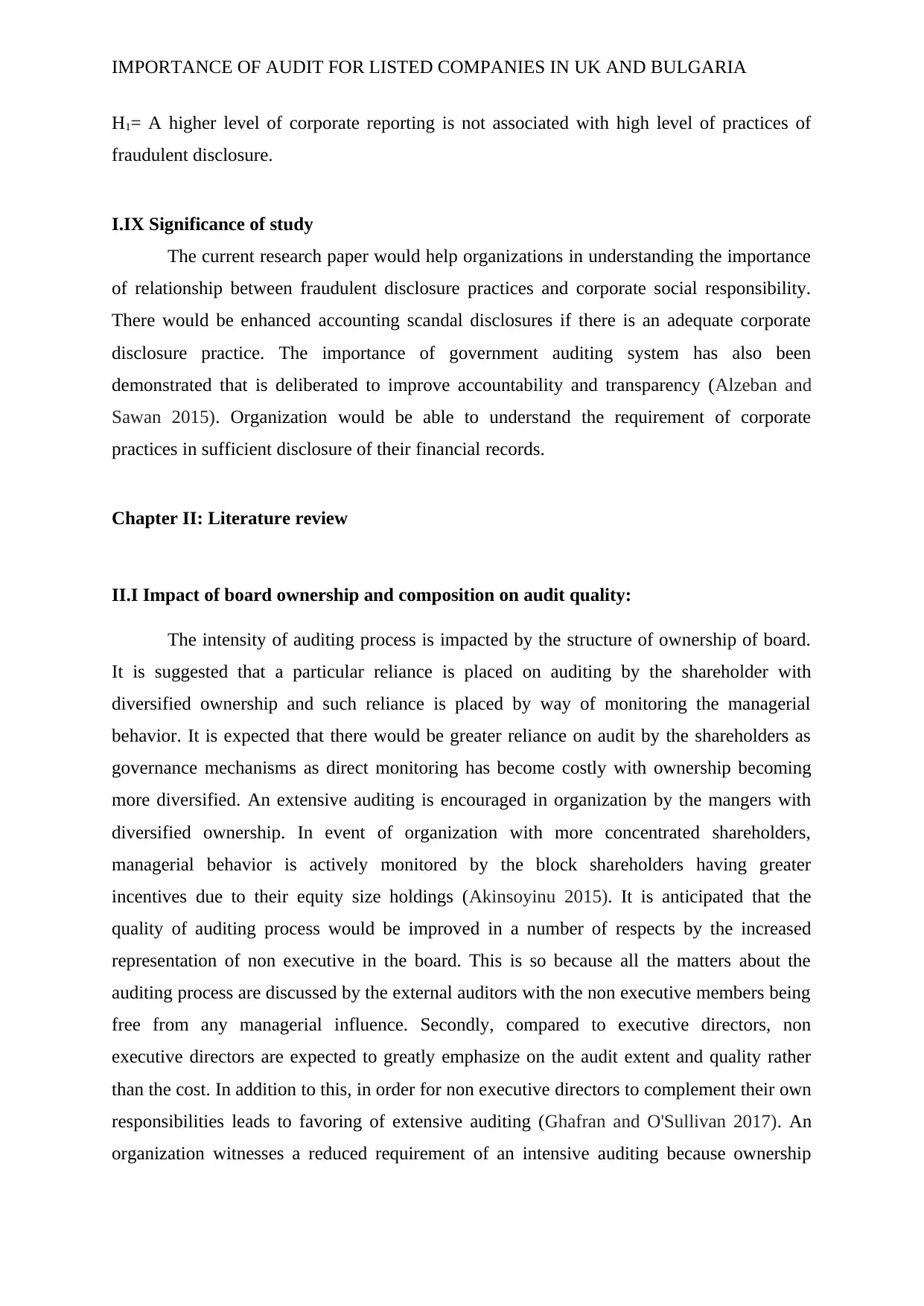
IMPORTANCE OF AUDIT FOR LISTED COMPANIES IN UK AND BULGARIA
H1= A higher level of corporate reporting is not associated with high level of practices of
fraudulent disclosure.
I.IX Significance of study
The current research paper would help organizations in understanding the importance
of relationship between fraudulent disclosure practices and corporate social responsibility.
There would be enhanced accounting scandal disclosures if there is an adequate corporate
disclosure practice. The importance of government auditing system has also been
demonstrated that is deliberated to improve accountability and transparency (Alzeban and
Sawan 2015). Organization would be able to understand the requirement of corporate
practices in sufficient disclosure of their financial records.
Chapter II: Literature review
II.I Impact of board ownership and composition on audit quality:
The intensity of auditing process is impacted by the structure of ownership of board.
It is suggested that a particular reliance is placed on auditing by the shareholder with
diversified ownership and such reliance is placed by way of monitoring the managerial
behavior. It is expected that there would be greater reliance on audit by the shareholders as
governance mechanisms as direct monitoring has become costly with ownership becoming
more diversified. An extensive auditing is encouraged in organization by the mangers with
diversified ownership. In event of organization with more concentrated shareholders,
managerial behavior is actively monitored by the block shareholders having greater
incentives due to their equity size holdings (Akinsoyinu 2015). It is anticipated that the
quality of auditing process would be improved in a number of respects by the increased
representation of non executive in the board. This is so because all the matters about the
auditing process are discussed by the external auditors with the non executive members being
free from any managerial influence. Secondly, compared to executive directors, non
executive directors are expected to greatly emphasize on the audit extent and quality rather
than the cost. In addition to this, in order for non executive directors to complement their own
responsibilities leads to favoring of extensive auditing (Ghafran and O'Sullivan 2017). An
organization witnesses a reduced requirement of an intensive auditing because ownership
H1= A higher level of corporate reporting is not associated with high level of practices of
fraudulent disclosure.
I.IX Significance of study
The current research paper would help organizations in understanding the importance
of relationship between fraudulent disclosure practices and corporate social responsibility.
There would be enhanced accounting scandal disclosures if there is an adequate corporate
disclosure practice. The importance of government auditing system has also been
demonstrated that is deliberated to improve accountability and transparency (Alzeban and
Sawan 2015). Organization would be able to understand the requirement of corporate
practices in sufficient disclosure of their financial records.
Chapter II: Literature review
II.I Impact of board ownership and composition on audit quality:
The intensity of auditing process is impacted by the structure of ownership of board.
It is suggested that a particular reliance is placed on auditing by the shareholder with
diversified ownership and such reliance is placed by way of monitoring the managerial
behavior. It is expected that there would be greater reliance on audit by the shareholders as
governance mechanisms as direct monitoring has become costly with ownership becoming
more diversified. An extensive auditing is encouraged in organization by the mangers with
diversified ownership. In event of organization with more concentrated shareholders,
managerial behavior is actively monitored by the block shareholders having greater
incentives due to their equity size holdings (Akinsoyinu 2015). It is anticipated that the
quality of auditing process would be improved in a number of respects by the increased
representation of non executive in the board. This is so because all the matters about the
auditing process are discussed by the external auditors with the non executive members being
free from any managerial influence. Secondly, compared to executive directors, non
executive directors are expected to greatly emphasize on the audit extent and quality rather
than the cost. In addition to this, in order for non executive directors to complement their own
responsibilities leads to favoring of extensive auditing (Ghafran and O'Sullivan 2017). An
organization witnesses a reduced requirement of an intensive auditing because ownership
⊘ This is a preview!⊘
Do you want full access?
Subscribe today to unlock all pages.

Trusted by 1+ million students worldwide
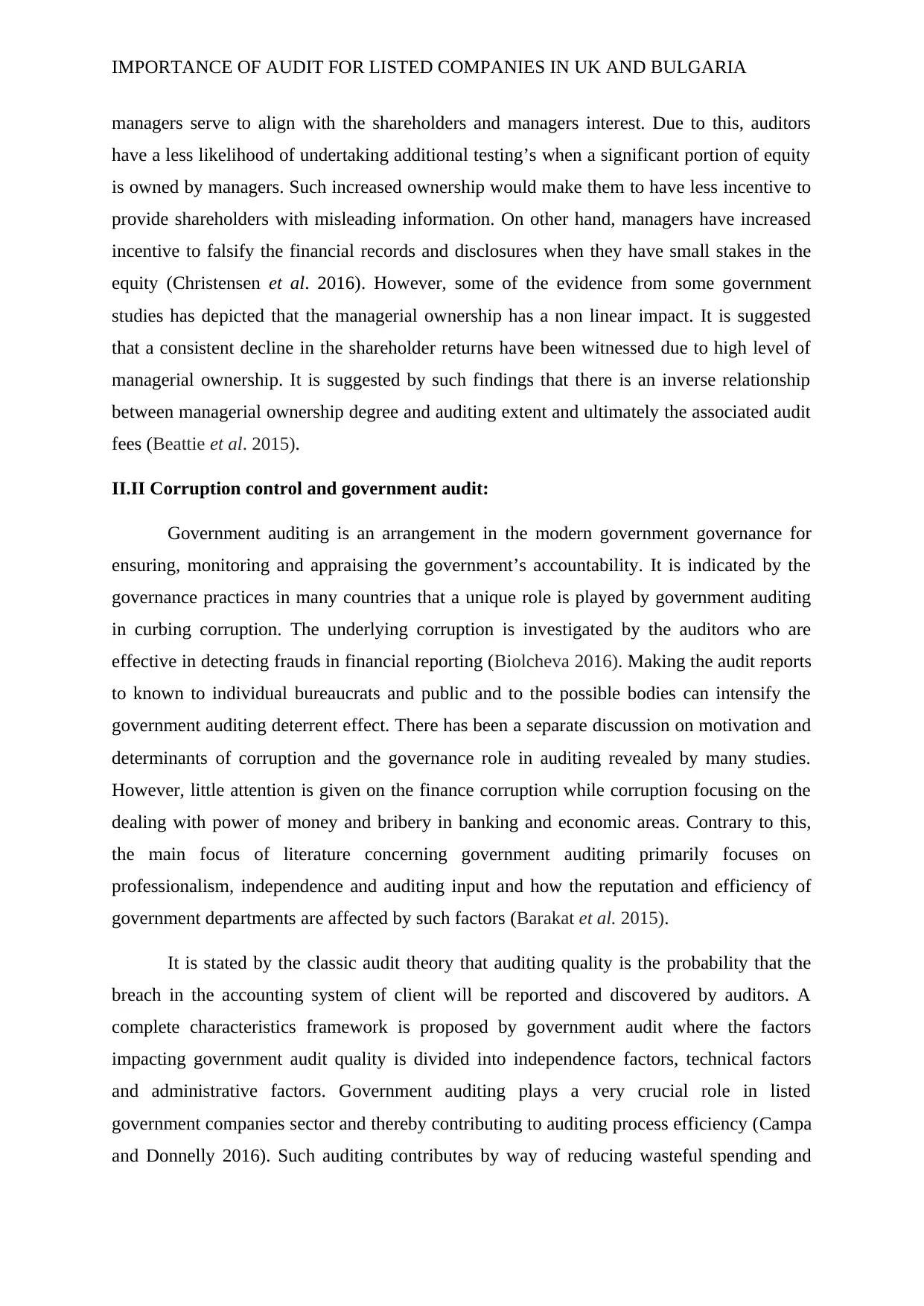
IMPORTANCE OF AUDIT FOR LISTED COMPANIES IN UK AND BULGARIA
managers serve to align with the shareholders and managers interest. Due to this, auditors
have a less likelihood of undertaking additional testing’s when a significant portion of equity
is owned by managers. Such increased ownership would make them to have less incentive to
provide shareholders with misleading information. On other hand, managers have increased
incentive to falsify the financial records and disclosures when they have small stakes in the
equity (Christensen et al. 2016). However, some of the evidence from some government
studies has depicted that the managerial ownership has a non linear impact. It is suggested
that a consistent decline in the shareholder returns have been witnessed due to high level of
managerial ownership. It is suggested by such findings that there is an inverse relationship
between managerial ownership degree and auditing extent and ultimately the associated audit
fees (Beattie et al. 2015).
II.II Corruption control and government audit:
Government auditing is an arrangement in the modern government governance for
ensuring, monitoring and appraising the government’s accountability. It is indicated by the
governance practices in many countries that a unique role is played by government auditing
in curbing corruption. The underlying corruption is investigated by the auditors who are
effective in detecting frauds in financial reporting (Biolcheva 2016). Making the audit reports
to known to individual bureaucrats and public and to the possible bodies can intensify the
government auditing deterrent effect. There has been a separate discussion on motivation and
determinants of corruption and the governance role in auditing revealed by many studies.
However, little attention is given on the finance corruption while corruption focusing on the
dealing with power of money and bribery in banking and economic areas. Contrary to this,
the main focus of literature concerning government auditing primarily focuses on
professionalism, independence and auditing input and how the reputation and efficiency of
government departments are affected by such factors (Barakat et al. 2015).
It is stated by the classic audit theory that auditing quality is the probability that the
breach in the accounting system of client will be reported and discovered by auditors. A
complete characteristics framework is proposed by government audit where the factors
impacting government audit quality is divided into independence factors, technical factors
and administrative factors. Government auditing plays a very crucial role in listed
government companies sector and thereby contributing to auditing process efficiency (Campa
and Donnelly 2016). Such auditing contributes by way of reducing wasteful spending and
managers serve to align with the shareholders and managers interest. Due to this, auditors
have a less likelihood of undertaking additional testing’s when a significant portion of equity
is owned by managers. Such increased ownership would make them to have less incentive to
provide shareholders with misleading information. On other hand, managers have increased
incentive to falsify the financial records and disclosures when they have small stakes in the
equity (Christensen et al. 2016). However, some of the evidence from some government
studies has depicted that the managerial ownership has a non linear impact. It is suggested
that a consistent decline in the shareholder returns have been witnessed due to high level of
managerial ownership. It is suggested by such findings that there is an inverse relationship
between managerial ownership degree and auditing extent and ultimately the associated audit
fees (Beattie et al. 2015).
II.II Corruption control and government audit:
Government auditing is an arrangement in the modern government governance for
ensuring, monitoring and appraising the government’s accountability. It is indicated by the
governance practices in many countries that a unique role is played by government auditing
in curbing corruption. The underlying corruption is investigated by the auditors who are
effective in detecting frauds in financial reporting (Biolcheva 2016). Making the audit reports
to known to individual bureaucrats and public and to the possible bodies can intensify the
government auditing deterrent effect. There has been a separate discussion on motivation and
determinants of corruption and the governance role in auditing revealed by many studies.
However, little attention is given on the finance corruption while corruption focusing on the
dealing with power of money and bribery in banking and economic areas. Contrary to this,
the main focus of literature concerning government auditing primarily focuses on
professionalism, independence and auditing input and how the reputation and efficiency of
government departments are affected by such factors (Barakat et al. 2015).
It is stated by the classic audit theory that auditing quality is the probability that the
breach in the accounting system of client will be reported and discovered by auditors. A
complete characteristics framework is proposed by government audit where the factors
impacting government audit quality is divided into independence factors, technical factors
and administrative factors. Government auditing plays a very crucial role in listed
government companies sector and thereby contributing to auditing process efficiency (Campa
and Donnelly 2016). Such auditing contributes by way of reducing wasteful spending and
Paraphrase This Document
Need a fresh take? Get an instant paraphrase of this document with our AI Paraphraser
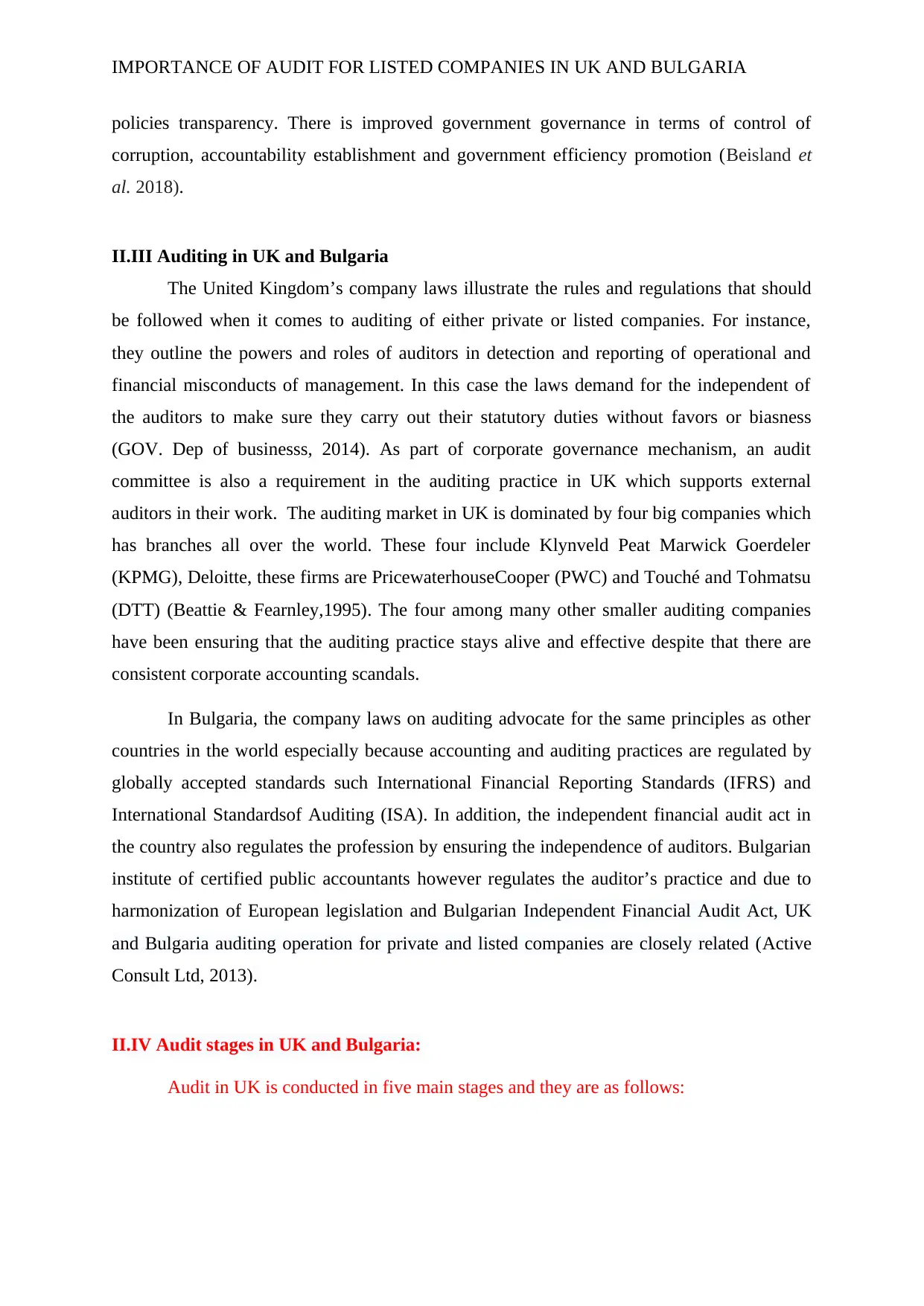
IMPORTANCE OF AUDIT FOR LISTED COMPANIES IN UK AND BULGARIA
policies transparency. There is improved government governance in terms of control of
corruption, accountability establishment and government efficiency promotion (Beisland et
al. 2018).
II.III Auditing in UK and Bulgaria
The United Kingdom’s company laws illustrate the rules and regulations that should
be followed when it comes to auditing of either private or listed companies. For instance,
they outline the powers and roles of auditors in detection and reporting of operational and
financial misconducts of management. In this case the laws demand for the independent of
the auditors to make sure they carry out their statutory duties without favors or biasness
(GOV. Dep of businesss, 2014). As part of corporate governance mechanism, an audit
committee is also a requirement in the auditing practice in UK which supports external
auditors in their work. The auditing market in UK is dominated by four big companies which
has branches all over the world. These four include Klynveld Peat Marwick Goerdeler
(KPMG), Deloitte, these firms are PricewaterhouseCooper (PWC) and Touché and Tohmatsu
(DTT) (Beattie & Fearnley,1995). The four among many other smaller auditing companies
have been ensuring that the auditing practice stays alive and effective despite that there are
consistent corporate accounting scandals.
In Bulgaria, the company laws on auditing advocate for the same principles as other
countries in the world especially because accounting and auditing practices are regulated by
globally accepted standards such International Financial Reporting Standards (IFRS) and
International Standardsof Auditing (ISA). In addition, the independent financial audit act in
the country also regulates the profession by ensuring the independence of auditors. Bulgarian
institute of certified public accountants however regulates the auditor’s practice and due to
harmonization of European legislation and Bulgarian Independent Financial Audit Act, UK
and Bulgaria auditing operation for private and listed companies are closely related (Active
Consult Ltd, 2013).
II.IV Audit stages in UK and Bulgaria:
Audit in UK is conducted in five main stages and they are as follows:
policies transparency. There is improved government governance in terms of control of
corruption, accountability establishment and government efficiency promotion (Beisland et
al. 2018).
II.III Auditing in UK and Bulgaria
The United Kingdom’s company laws illustrate the rules and regulations that should
be followed when it comes to auditing of either private or listed companies. For instance,
they outline the powers and roles of auditors in detection and reporting of operational and
financial misconducts of management. In this case the laws demand for the independent of
the auditors to make sure they carry out their statutory duties without favors or biasness
(GOV. Dep of businesss, 2014). As part of corporate governance mechanism, an audit
committee is also a requirement in the auditing practice in UK which supports external
auditors in their work. The auditing market in UK is dominated by four big companies which
has branches all over the world. These four include Klynveld Peat Marwick Goerdeler
(KPMG), Deloitte, these firms are PricewaterhouseCooper (PWC) and Touché and Tohmatsu
(DTT) (Beattie & Fearnley,1995). The four among many other smaller auditing companies
have been ensuring that the auditing practice stays alive and effective despite that there are
consistent corporate accounting scandals.
In Bulgaria, the company laws on auditing advocate for the same principles as other
countries in the world especially because accounting and auditing practices are regulated by
globally accepted standards such International Financial Reporting Standards (IFRS) and
International Standardsof Auditing (ISA). In addition, the independent financial audit act in
the country also regulates the profession by ensuring the independence of auditors. Bulgarian
institute of certified public accountants however regulates the auditor’s practice and due to
harmonization of European legislation and Bulgarian Independent Financial Audit Act, UK
and Bulgaria auditing operation for private and listed companies are closely related (Active
Consult Ltd, 2013).
II.IV Audit stages in UK and Bulgaria:
Audit in UK is conducted in five main stages and they are as follows:
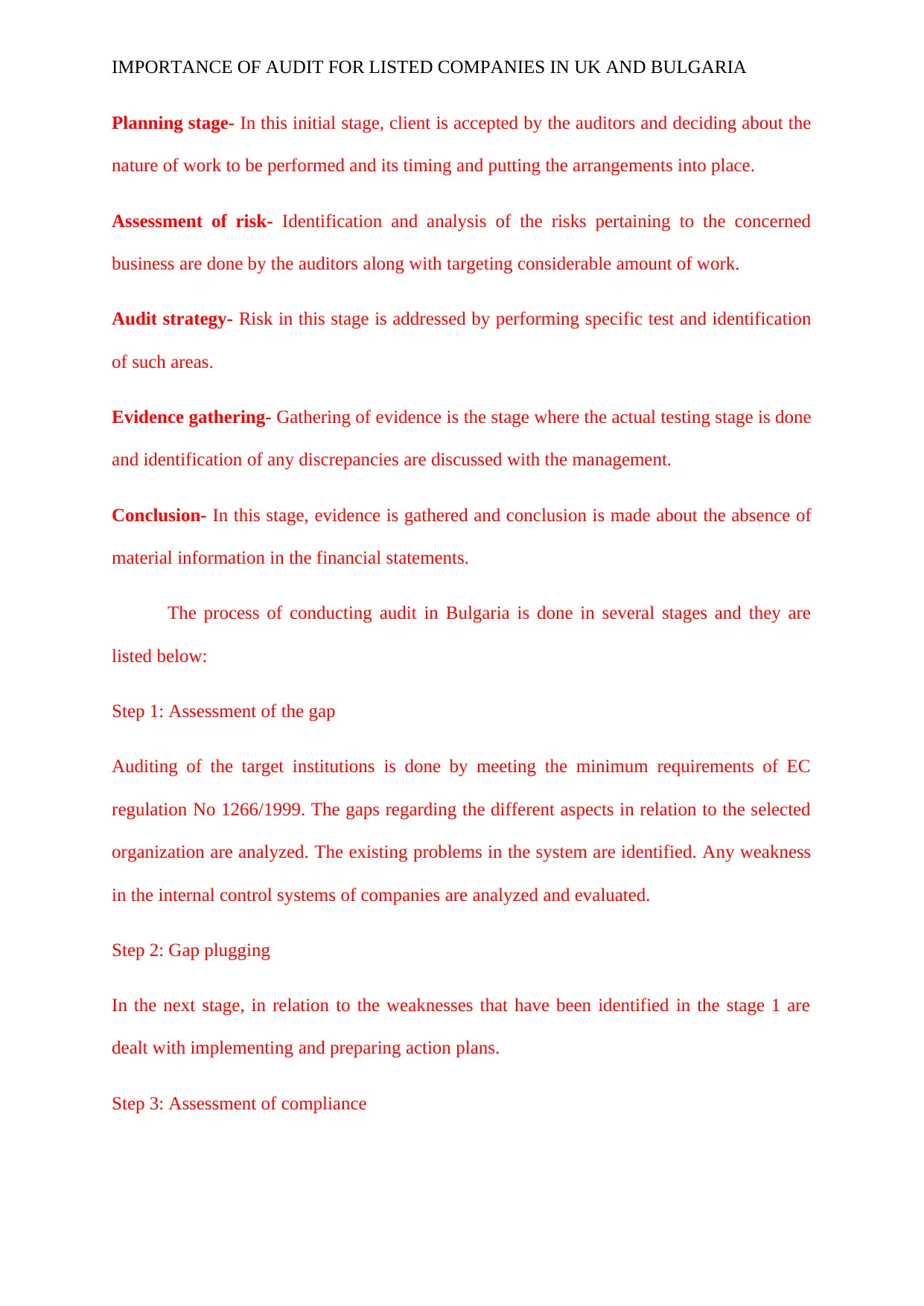
IMPORTANCE OF AUDIT FOR LISTED COMPANIES IN UK AND BULGARIA
Planning stage- In this initial stage, client is accepted by the auditors and deciding about the
nature of work to be performed and its timing and putting the arrangements into place.
Assessment of risk- Identification and analysis of the risks pertaining to the concerned
business are done by the auditors along with targeting considerable amount of work.
Audit strategy- Risk in this stage is addressed by performing specific test and identification
of such areas.
Evidence gathering- Gathering of evidence is the stage where the actual testing stage is done
and identification of any discrepancies are discussed with the management.
Conclusion- In this stage, evidence is gathered and conclusion is made about the absence of
material information in the financial statements.
The process of conducting audit in Bulgaria is done in several stages and they are
listed below:
Step 1: Assessment of the gap
Auditing of the target institutions is done by meeting the minimum requirements of EC
regulation No 1266/1999. The gaps regarding the different aspects in relation to the selected
organization are analyzed. The existing problems in the system are identified. Any weakness
in the internal control systems of companies are analyzed and evaluated.
Step 2: Gap plugging
In the next stage, in relation to the weaknesses that have been identified in the stage 1 are
dealt with implementing and preparing action plans.
Step 3: Assessment of compliance
Planning stage- In this initial stage, client is accepted by the auditors and deciding about the
nature of work to be performed and its timing and putting the arrangements into place.
Assessment of risk- Identification and analysis of the risks pertaining to the concerned
business are done by the auditors along with targeting considerable amount of work.
Audit strategy- Risk in this stage is addressed by performing specific test and identification
of such areas.
Evidence gathering- Gathering of evidence is the stage where the actual testing stage is done
and identification of any discrepancies are discussed with the management.
Conclusion- In this stage, evidence is gathered and conclusion is made about the absence of
material information in the financial statements.
The process of conducting audit in Bulgaria is done in several stages and they are
listed below:
Step 1: Assessment of the gap
Auditing of the target institutions is done by meeting the minimum requirements of EC
regulation No 1266/1999. The gaps regarding the different aspects in relation to the selected
organization are analyzed. The existing problems in the system are identified. Any weakness
in the internal control systems of companies are analyzed and evaluated.
Step 2: Gap plugging
In the next stage, in relation to the weaknesses that have been identified in the stage 1 are
dealt with implementing and preparing action plans.
Step 3: Assessment of compliance
⊘ This is a preview!⊘
Do you want full access?
Subscribe today to unlock all pages.

Trusted by 1+ million students worldwide
1 out of 38
Related Documents
Your All-in-One AI-Powered Toolkit for Academic Success.
+13062052269
info@desklib.com
Available 24*7 on WhatsApp / Email
![[object Object]](/_next/static/media/star-bottom.7253800d.svg)
Unlock your academic potential
Copyright © 2020–2026 A2Z Services. All Rights Reserved. Developed and managed by ZUCOL.





